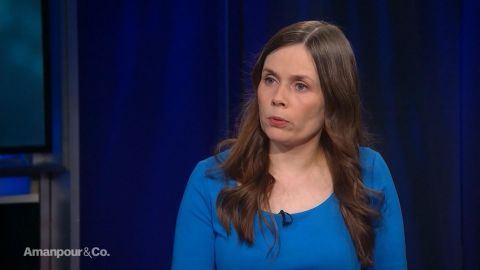Read Transcript EXPAND
CHRISTIANE AMANPOUR: You were an activist.
KATRĺN JAKOBSDÓTTIR, ICELANDIC PRIME MINISTER: Yes, before.
AMANPOUR: And you came to politics and you became prime minister sort of from the grassroots up. How did that happen? What made you become an activist? How was that journey?
JAKOBSDÓTTIR: Well, I come from a very political, from a very left-wing family. I began really just by demonstrating because of environmental interests. So, that was my first move in politics and I never intended to become a politician. It wasn’t exactly my dream. I wanted to be some sort of a cultural person. So — but I went into politics and I’m still there. But I can always turn to culture later.
AMANPOUR: How does the activism inform your politics?
JAKOBSDÓTTIR: Well, I think, of course, it’s very different to be an activist who comes to demonstrate. But it’s very different to be in politics and you have to learn that within the system you have to make compromises. But it’s good to have these roots and embrace activism when you meet it. Now, young people in Iceland like around Europe are demonstrating because of climate. And I think it’s actually something that we should embrace and listen to them.
AMANPOUR: Yes. I mean, I must say, it has taken the world by storm. Obviously, it’s incapsulated in the figure of this small young Swedish Greta Thunberg, only 16 years old and starting with this lone protest and inspiring millions of people around the world. Does that give you hope for movement on this particular issue, the environment?
JAKOBSDÓTTIR: Well, I think a lot has changed. When I — I was elected to Parliament in 2007. And most generally, politicians weren’t talking about climates and they weren’t talking about gender quality either. So, I will mention two of the themes that have been prominent in my politics. Things have changed. Political parties have all some sort of a position when it comes to climate or gender equality, and that’s a good thing. But it’s also very important that policies will not just be words on a paper but also will become actions.
AMANPOUR: Your party’s been described as a — it’s like a new breed of Nordic left-wing parties. You link democratic socialism with environmentalism, feminism and anti-militarism. But how does that translate into a political party?
JAKOBSDÓTTIR: These are the four pillars of the parties — of the party. And actually, when I entered this party, it was in 2002, and we were considered to be doomed for opposition at all times. So, people said, “You can’t really be in government with the Left-Greens because they are impossible to work with, cooperate.”
AMANPOUR: That’s you?
JAKOBSDÓTTIR: That’s me.
AMANPOUR: Yes. Impossible to work with?
JAKOBSDÓTTIR: Impossible. But then, of course, the 2008 crisis created conditions in Iceland because —
AMANPOUR: The 2008 crisis, the financial crisis?
JAKOBSDÓTTIR: Yes, the 2008.
AMANPOUR: Yes.
JAKOBSDÓTTIR: Yes, the financial crisis. So, then we actually first went into government with the Social Democrats. And of course, that changes a party to go into government.
About This Episode EXPAND
Christiane Amanpour speaks with Katrín Jakobsdóttir, the Icelandic Prime Minister; and Craig Ferguson, late-night TV host and author of “Riding the Elephant.” Alicia Menendez speaks with Amanda Gorman, the first National Youth Poet Laureate.
LEARN MORE


